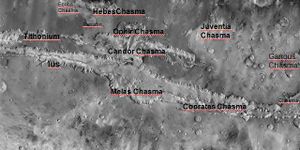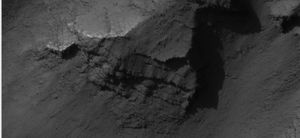Difference between revisions of "Valles Marineris"
| Line 24: | Line 24: | ||
{{SettlementIndex}} | {{SettlementIndex}} | ||
[[Category:Topography]] | [[Category:Topography]] | ||
| − | |||
| − | |||
Revision as of 20:54, 7 January 2020
Valles Marineris is a vast canyon system stretching 4000 km across the Mars equatorial region east of the Tharsis Bulge. The full system is capable of stretching the entire length of the United States. The valley's depth can reach 10 km in some locations. Remember the Earth's Grand Canyon is only 1.6 kilometers deep.
Valles Marineris (latin for Mariner Valleys) was named after the Mariner 9 orbiter (1971-72) which made the discovery. "Chasma" has been designated by the International Astronomical Union to refer to an elongate, steep-sided depression. Candor Chasma is one of the largest canyons that exist in the system.
Valles Marineris is the largest canyon system in the solar system. The name for the whole system of canyons is Valles Marineris. Starting at the west with Noctis Labyrinthus in the Phoenicis Lacus quadrangle, the canyon system ends in the Margaritifer Sinus quadrangle. The walls of the canyons often contain many layers. The floors of some of the canyons contain large deposits of layered materials. Some researchers believe that the layers were formed when water once filled the canyons.[1] [2] [3] [4]
References:
- ↑ Cabrol, N. and E. Grin (eds.). 2010. Lakes on Mars. Elsevier. NY
- ↑ McCauley, J. 1978. Geologic map of the Coprates quadrangle of Mars. U.S. Geol. Misc. Inv. Map I-897
- ↑ Nedell | first1 = S. | display-authors = etal | year = 1987 | title = Origin and evolution of the layered deposits in the Valles Marineris, Mars | url = | journal = Icarus | volume = 70 | issue = | pages = 409–441
- ↑ Weitz, C. and T. Parker. 2000. New evidence that the Valles Marineris interior deposits formed in standing bodies of water. LPSC XXXI. Abstract 1693
See Also
External Links
| Concepts: | Greenhouse · Settlements · Locations · General |
| Hazards: | Space Weather · Climate · General |
| Technology: | Hi-Tech · Lo-Tech · Energy · Spaceflight science · Communication · General |
| Human Considerations: | Economics · Health · Governance · Trade · Law · Social |










